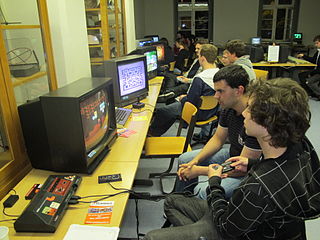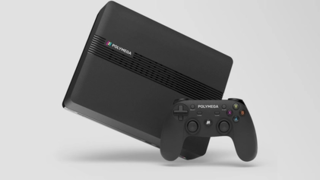VisualBoyAdvance is a free emulator of the Game Boy, Game Boy Color, and Game Boy Advance handheld game consoles as well as of Super Game Boy and Super Game Boy 2. It is still downloadable to this day.
Homebrew, when applied to video games, refers to software produced by hobbyists for proprietary video game consoles which are not intended to be user-programmable. The official documentation is often only available to licensed developers, and these systems may use storage formats that make distribution difficult, such as ROM cartridges or encrypted CD-ROMs. Many consoles have hardware restrictions to prevent unauthorized development.
SVGAlib is an open-source low-level graphics library which ran on Linux and FreeBSD and allowed programs to change video mode and display full-screen graphics, without the use of a windowing system. Alongside X11 and the General Graphics Interface, it was one of the earliest libraries allowing graphical video games on Linux.

Retrogaming, also known as classic gaming and old school gaming, is the playing and collection of personal computers, consoles, and video games from earlier decades. Usually, retrogaming is based upon systems that are outmoded or discontinued, although ported retrogaming allows games to be played on modern hardware via ports, emulations or compilations. It is typically for nostalgia, preservation, or authenticity. A new game could be retro styled, such as an RPG with turn-based combat and pixel art in isometric camera perspective, as well as chip-tune styled music.
Linux-based operating systems can be used for playing video games. Because few games natively support the Linux kernel, various software has been made to run Windows games, software, and programs, such as Wine, Cedega, DXVK, and Proton, and managers such as Lutris and PlayOnLinux. The Linux gaming community has a presence on the internet with users who attempt to run games that are not officially supported on Linux.

GOG.com is a digital distribution platform for video games and films. It is operated by GOG sp. z o.o., a wholly owned subsidiary of CD Projekt based in Warsaw, Poland. GOG.com delivers DRM-free video games through its digital platform for Microsoft Windows, macOS and Linux.
The ODROID is a series of single-board computers and tablet computers created by Hardkernel Co., Ltd., located in South Korea. Even though the name ODROID is a portmanteau of open + Android, the hardware is not actually open source because some parts of the design are retained by the company. Many ODROID systems are capable of running not only Android, but also regular Linux distributions.

RetroArch is a free and open-source, cross-platform frontend for emulators, game engines, video games, media players and other applications. It is the reference implementation of the libretro API, designed to be fast, lightweight, portable and without dependencies. It is licensed under the GNU GPLv3.

Super Potato is a Japanese video game store known for its collection of retrogames.

PICO-8 is a virtual machine and game engine created by Lexaloffle Games. It is a fantasy video game console that mimics the limited graphical and sound capabilities of the old 8-bit systems of the 1980s to encourage creativity and ingenuity in producing games without being overwhelmed with the many possibilities of modern tools and machines. Such limitations also give PICO-8 games a particular look and feel.
The Libre Computer Project is an effort initiated by Shenzhen Libre Technology Co., Ltd., with the goal of producing standards-compliant single-board computers (SBC) and upstream software stack to power them.
The ninth generation of video game consoles began in November 2020 with the releases of Microsoft's Xbox Series X and Series S console family and Sony's PlayStation 5.

The Evercade is a handheld game console developed and manufactured by British company Blaze Entertainment. It focuses on retrogaming with ROM cartridges that each contain a number of emulated games. Evercade was released in May 2020 and upon its launch offered 10 game cartridges with a combined total of 122 games.

Polymega is a home video game console developed by American company Playmaji, Inc. It is a retro gaming console offering backwards compatibility with several CD-based and cartridge-based platforms: PlayStation, TurboGrafx-CD, Neo Geo CD, Sega CD, Sega Saturn, Nintendo Entertainment System (NES), Sega Genesis, Sega 32X, Super Nintendo Entertainment System (SNES), and Nintendo 64. It includes a built-in CD drive, while separate add-ons known as Element Modules provide support for cartridge-based games.
Anbernic is a Chinese handheld gaming console company founded in 2017 in Shenzhen by Shenzhen YangLiMing Electronic Technology Co.
Chōjin Heiki Zeroigar is a 1997 vertically scrolling shoot 'em up video game created by Satoshi Fujishima and published by NEC for its PC-FX console. It is notable for being the only shooter in the console's library, even though its predecessor, the PC Engine/TurboGrafx-16, was known for excelling in this genre. An English-language fan translation was released in 2015 with the title God-Fighter Zeroigar.








